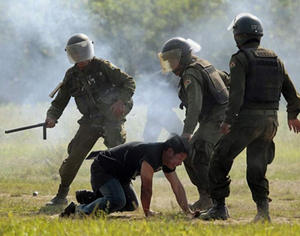By Emily Achtenberg, NACLA, October 1, 2011
 |
| Police raid on TIPNIS protesters. Credit: Erbol. |
Last Sunday federal police brutally repressed lowland indigenous
marchers protesting the TIPNIS highway. The move has sparked widespread public
outrage in Bolivia, while the response from the government of President Evo
Morales—including the sudden resignation of Minister of Interior Sacha Llorenti
on Tuesday evening—raises more questions than answers.
On Sunday afternoon, 500 federal police using tear gas, rubber
bullets, and batons launched a surprise raid on the
protesters’ camp near Yucumo, in the department of Beni.
Police raid on
TIPNIS protesters. Credit: Erbol.
Just hours earlier, the protesters had received an invitation from the
government to send a delegation to La Paz to resume negotiations, which they
were about to consider in a community-wide meeting.
According to still unconfirmed
reports, the raid resulted in one death (a baby), 45 wounded, and at least 37
unaccounted for, including 7 children. In the confusion, many protesters fled
into the woods and children were separated from their families. The police also
broke up a nearby road blockade maintained by several hundred “colonists”
(highland indigenous farmers), which had been impeding the passage of the march—with
the government’s tacit support—for several weeks.
The raid came the day after Foreign Minister David Choquehuanca, who
had arrived at the march in an effort to mediate the impasse with the
colonists, was forced by a group of indigenous women to act as a “human shield,”
leading the protest past a police barricade positioned ahead of the roadblock.
Later released unharmed, Choquehuanca said that he wanted to continue discussions with the protesters. However, the government officially labeled this
incident a “kidnapping.”
Indigenous women
march with David Choquehuanca. Credit: La Razón.
On Monday morning, government officials cited this episode as a
rationale for the police action. According to press secretary Iván Canelas, the
march had become a “focus of violence.”
Minister of Interior Sacha Llorenti maintained that police had been threatened by
marchers with bows and arrows, and that the intervention was necessary to save
the protestors from a confrontation with the colonists.
But as TV footage
showed indigenous men and women being beaten, gagged with adhesive tape, and
dragged on their knees to waiting vehicles, protests
against the police repression mounted and spread to regions throughout the
country. In Beni, indigenous supporters blocked buses
of detained marchers from arriving in San Borja, forcing them to detour to
Rurrenabaque, where another group of protestors liberated many of the apparent
prisoners before they could be boarded onto a plane to an unknown destination.
An indefinite civic strike has closed businesses and government
offices throughout the Beni department, with six road blockades around the
capital. More than 5,000 marched and held vigils in La Paz on Monday, while
hunger strikes began in Santa Cruz. Also on Monday, the Minister of Defense
resigned in protest, followed the next day by two sub-cabinet level officials.
In a Monday evening press conference, President Evo Morales lamented and repudiated the violence and abuses committed by police—while suggesting that the
outcome could have been worse, had the marchers been permitted to confront the
colonists. He denied ordering the police action and called for a full
investigation by a high-level commission of human rights monitors,
international organizations, and Bolivia’s independent Ombudsman.
Chronology of Beni
protesters' interventions to rescue detained marchers. Credit: Página Siete.
Morales also announced that he would “suspend construction” of the
controversial road through the TIPNIS park and indigenous territory, pending
the outcome of a national debate and a referendum to be held in the Cochabamba
and Beni departments. He emphasized the road’s importance for Bolivia’s
economic integration, its basis in past legal norms, and its support by 12 (out
of 64) indigenous communities within the TIPNIS.
On Tuesday evening, after a public controversy
involving a just-resigned vice minister, police officials, and Sacha Llorenti
over responsibility for ordering the raid, Llorenti stepped down—without any
admission of wrong-doing. Llorenti’s claim that the intervention was authorized
by a legal order was also denied by the
Attorney General.
As the TIPNIS protesters and their growing legions of supporters
prepare for a national civic strike on Wednesday, led by the COB (Bolivian
Workers Central), the government’s actions leave many questions unanswered.
Who was responsible for ordering the police raid? How will the “intellectual
authors” of the violent intervention (and not just a few “rogue” police) be
held accountable?
Regarding the TIPNIS road, exactly what actions have been suspended?
The controversial segment through the TIPNIS park is not yet under construction.
La Paz mobilization
to support TIPNIS marchers, September 26. Credit: La Razón.
There’s no evidence that work has been halted on adjoining sections
that are currently being built, or that the government plans to cancel its
construction contract with Brazilian company OAS.
And while the proposal for a national debate and departmental
referendum may sound like participatory democracy, how does it satisfy the
government’s legal obligation to seek the “free, prior, and informed consent” specifically of indigenous
groups residing within the affected territory? This is a requirement of
international accords to which Bolivia subscribes, as well as the Bolivian
constitution. It’s not yet clear if the Morales government recognizes that the
decision on the TIPNIS road can’t just be subject to a popular vote (which the
government would likely win within the two departments), but must respect the
rights of indigenous minorities within the plurinational state.
In the meantime, conservative opponents of the Morales government are
seizing the opportunity to exploit the current crisis in every possible way. It’s
a critical and risky moment for Bolivia’s "process of change."
No comments:
Post a Comment